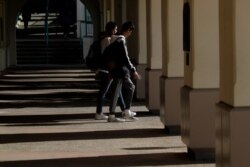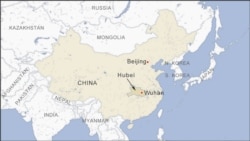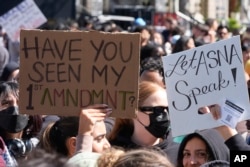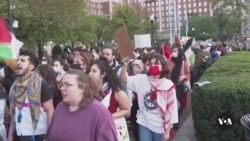Student Union
- By VOA News
Students Scramble to Catch Last Flights Home
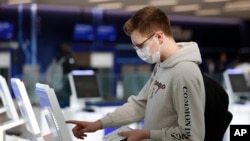
Parents, students and universities are scrambling across the United States and abroad as schools cancel classes and send students packing because of the COVID-19 pandemic.
Students are being told to move back home as soon as possible in the U.S. and internationally. Some are being told to take their belongings with them and leave their rooms empty.
“Everyone is in a panic,” said a staff worker at an Ivy-League university on the East Coast, who asked to remain anonymous.
The list of closed schools that started as a handful three weeks ago is now dozens long and includes the University of California system, New York University, Columbia University, Penn State University and colleges and universities throughout the country that host the largest numbers of international and study-abroad students.
The closing of campuses -- and the moving of classes online -- in the U.S. come shortly after universities shut down their overseas study-abroad programs over the past three weeks, especially in Italy, the No. 2 study-abroad destination of choice for U.S. students after Britain. Italy’s infection rate continues to skyrocket, according to health officials.
While some students have chosen to stay abroad, many have clamored to get on flights just as airlines cancel international trips and ground planes. Parents try to navigate travel plans from across the ocean.
One father posted on social media that his daughter had a one-way ticket from Charles de Gaulle International Airport to the United States. And although she arrived three hours early, she couldn’t get on the flight, describing the scene at the airport as “chaos.” The young woman took a train to London and got a flight out of Heathrow.
Parents in online groups report that some students are returning to the United States without being scanned by health officials for fever or symptoms. They have cited John F. Kennedy, O’Hare and Logan international airports, all major U.S. hubs in New York, Chicago and Boston, respectively.
On March 16 a student at American University in Washington D.C. tested positive for COVID-19.
“The student had traveled within the United States and returned to campus before the end of spring break. As soon as the student presented with symptoms and contacted the Student Health Center, we took immediate action to help the student and protect the community,” the university reported.
“The student was self-isolated in an on-campus room with private bathroom facilities, away from other members of the community, and food and essential personal items were and continue to be delivered.”
For the past four weeks, some students in the U.S. have tested positive for COVID-19, an influenza that emanated from a live-animal market in Wuhan, China, in late December and spread quickly to the nearby population, including university students there. Many Chinese students traveled during winter break inside and outside China. Many of the more than 300,000 Chinese students in the United States returned from China in January after visiting home.
The fatality rate among young people is lower than for people aged 80 years and older, according to the World Health Organization and the U.S. Centers for Disease Control. The infected can, health officials say, spread the infection with or without symptoms up to 14 days after catching the virus.
Last week, students in residence halls at American University in Washington D.C. were instructed “to leave campus by Monday, March 23 and return to their permanent addresses for the remainder of the semester,” according to its website. Many schools have suspended classes because of spring break
“We strongly encourage students to depart campus as soon as possible to help reduce the potential risk of transmission or spread of COVID-19. We know this is stressful and challenging for students and their families and can cause financial and other hardships.”
Parents erupted online over the frenzy and cost of storage and moving. American University relented on an earlier edict that students return from spring break to pack up. Students there and at other universities have been ordered home to shelter in place until the virus runs its course and people can resume group activities.
“You are insisting that my daughter travel to D.C. where she will be exposed to Coronavirus through travel, eating out and staying at a hotel,” the mother of a sophomore posted online from New York. “Then she will return home to us. If she gets sick engaging in this idiotic endeavor (why does the room need to be empty, nobody is moving in?) she is likely to give it to us, because she is living at home. We will then have an extremely terrifying chance of ending up in an overwhelmed ICU or dead. What possible justification for this could their possibly be?”
Many students will not return to classes this semester and will graduate without ceremony.
"I am actually moving out today. I am about to go to my last in-person lecture before I go to the store to hopefully get more food and hand sanitizer. I am from China so I know how serious COVID-19 can be,” said Mike She, an accounting student at Temple University in Philadelphia, three days ago. “I believe wearing masks is absolutely necessary and Americans should care more about this pandemic than they are right now."
Thomas Zhu contributed to this report.
See all News Updates of the Day
- By VOA News
Paper: International students faced extra pandemic challenges
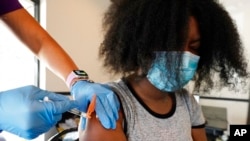
Astrobites, which describes itself as "a daily astrophysical literature journal written by graduate students in astronomy since 2010," focuses on the challenges international students faced during the COVID-19 pandemic.
It examines a paper published in the Journal of Comparative & International Higher Education entitled The Impact of the COVID-19 Pandemic on International Students in a Public University in the United States: Academic and Non-academic Challenges.
Read the Astrobites article here. (April 2024)
- By VOA News
15 cheapest US universities for international students
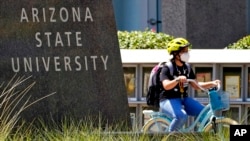
Yahoo!Finance has compiled a list of the 15 cheapest U.S. universities for international students.
Among them: Arizona State University, the University of North Carolina at Chapel Hill and Michigan State University.
Read the list here. (March 2024)
- By VOA News
Studying STEM? International students have funding options

US News & World Report takes a look at funding options for international students pursuing STEM degrees in the U.S.
The article explains the different kinds of scholarships and grants and offers tips on getting part-time jobs and private student loans. Read the full story here. (March 2024)
- By Robin Guess
US campuses are battlegrounds in free speech debate
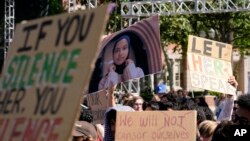
This week the University of Southern California canceled the graduation speech of its senior class valedictorian at a time when there is a growing debate over the limits of free speech on American college campuses.
USC’s Asna Tabassum, a Muslim biomedical engineer major, was selected from among 100 outstanding students to address the graduating class of 2024 this May. However, the school withdrew the invitation for her to speak at the graduation ceremony citing safety concerns.
Tabassum denounced the decision, which she attributed to her public support for Palestinian human rights. She said it is part of “a campaign of hate meant to silence my voice.”
The school maintains it is a safety issue, not about free speech. School officials say they received an alarming number of violent threats after selecting her as speaker.
USC is one of many American universities that have struggled with policies over free speech and campus protest since October’s Hamas terrorist attack on Israel and the continuing fighting in Gaza. After weeks or months of on-campus protests and rallies, schools have been taking more forceful action to punish protesters who administrators say have become disruptive.
On Thursday at Columbia University in New York, police arrested more than 100 students who had gathered on campus for pro-Palestinian protests. The school’s dean wrote that the protesters had been told several times that they were violating university policies and would be suspended. The students say they were exercising their free speech rights.
At Washington’s American University, protests in all campus buildings have been banned by the school’s president since January. Under the new policy, students may not hold rallies, engage in silent protests or place posters in any campus building.
Protests and safety
University students have a long history of engaging in political activism. From the Vietnam War to abortion rights, universities have played a key role in American political debates.
However, students now say that schools like AU with a long-standing protest culture are silencing protesters with new rules.
Arusa Islam, American University student body president-elect and current vice president, says the policies are preventing an open discussion about U.S. foreign policy.
“Indoor protesting was never a problem, it was never an issue before October 7th,” Islam said. “Students were allowed to put up posters in buildings and students were allowed to have a silent protest.”
“And now we don’t have that right anymore,” she added. “We have been silenced and it is affecting us greatly.”
American University’s president, Sylvia Burwell, says the school’s new policies are intended to ensure that protests do not disrupt university activity.
Burwell also referred to recent events on campus that “made Jewish students feel unsafe and unwelcome.” She added, antisemitism is abhorrent, wrong, and will not be tolerated at American University.
While administrators insist that they are making narrow restrictions in the interests of providing an education, critics say the policies have a far-reaching effect.
At Cornell University, where new rules took effect in January, Claire Ting, the executive vice president of the Cornell Student Assembly, said the policies have had an unsettling effect on campus.
“The campus climate at Cornell has been tense surrounding free speech in recent times,” Ting emailed VOA.
Ting said that both students and faculty feel the policy has had chilling effects on free expression.
“Students report facing arbitrary, escalating punishment for violating the policy, with the policy itself lacking clear outlines for the consequences of civil disobedience,” she added.
In its new policy Cornell warns students that disciplinary action may be taken if protests impede people or traffic, damage school property or interfere with the school’s operations in any way.
In its campus-wide notice explaining the new guidelines, the school wrote that the new policy would ensure that expressive activity is allowed but must remain nonviolent.
The Foundation for Individual Rights in Education, also known as FIRE, has tracked free speech issues on American campuses.
FIRE and College Pulse have produced an annual survey, since 2022, ranking colleges based on their policies and what students say about the free speech climate on campus.
This year the group reported that “alarming” numbers of students say they self-censor or “find their administrations unclear” on free speech issues.
“College campuses have always been places where students have been unafraid to express themselves and with the recent Gaza conflict after the 10/7 attacks, it’s been very heated on both sides of this issue,” said Zach Greenberg, the senior program officer of FIRE.
Harvard ranked last in this year’s survey. FIRE said the school punished some professors and researchers over what they had said or written, and students reported a poor climate for free speech on campus.
The controversy came to Congress late last year, when Harvard’s president testified over complaints of widespread antisemitism.
“I don’t think you’d find many students on campus right now that would say we are the model for flourishing free speech and ideas exchange in the country,” said J. Sellers Hill, president of Harvard’s school newspaper The Harvard Crimson.
“But I think you’ve really seen that be acknowledged by administrators and it seems to be something they are dedicated to taking on.”
As the head of The Harvard Crimson, Hill manages the paper’s 350 editors and 90 reporters, who’ve covered, in detail, the ongoing free speech/protests controversy and the resignation of former President Claudine Gay following her testimony to Congress.
“I think no one would dispute Harvard has work to do and progress to make,” Hill said. “I think it’s a tough sell, for me, that Harvard is uniquely in its own league in terms of intolerance of speech. That doesn’t square with what I have seen on our college campus or on other college campuses around the country. I think Harvard is held to a higher standard.”
Proposed settlement offered over financial aid allegations
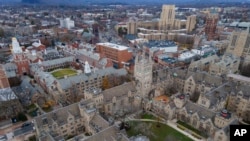
A group of U.S. colleges and universities have agreed to settle a lawsuit alleging deceptive financial aid tactics, according to a report published in The Hill.
The schools would pay $284 million to plaintiffs who were enrolled full-time and received financial aid between 2003 and 2024.
The schools have denied the allegations. (April 2024)




